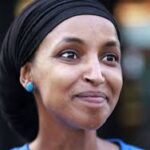Table of Contents
Squad’ Member Ilhan Omar Secures Victory in Minnesota Democratic Primary: A Political Force to be Reckoned With
In a resounding affirmation of her political influence and popularity, U.S. Representative Ilhan Omar has won the Democratic primary in Minnesota’s 5th Congressional District. Omar, a member of the progressive group of lawmakers known as “The Squad,” secured her victory despite facing challenges from both moderate Democrats and external criticism. Her win solidifies her position as a leading voice in the progressive movement and sets the stage for what could be another term in Congress marked by advocacy for bold policies and social justice.
A Progressive Powerhouse
Ilhan Omar, who was first elected to Congress in 2018, has become one of the most recognizable faces of the progressive wing of the Democratic Party. Representing a district that includes Minneapolis, a city that has been at the forefront of national conversations on police reform and racial justice, Omar has consistently pushed for transformative policies. Her agenda includes advocating for Medicare for All, a Green New Deal, and significant reforms to U.S. foreign policy.
Omar’s victory in the primary is not just a win for her, but also a testament to the strength of the progressive movement within the Democratic Party. Over the past few years, the movement has gained significant traction, particularly among younger voters and communities of color. Omar’s platform, which aligns closely with the priorities of this movement, has resonated with many voters in her district, helping her to overcome opposition and secure the nomination once again.
Overcoming Challenges from Within and Without
Omar’s path to victory was not without challenges. She faced a well-funded primary opponent, Don Samuels, a former Minneapolis city council member who positioned himself as a moderate alternative to Omar. Samuels, who garnered support from some local leaders and community members, criticized Omar for what he described as her divisive rhetoric and focus on national issues at the expense of local concerns.
Despite these criticisms, Omar’s grassroots support proved formidable. She has built a strong base of loyal supporters who appreciate her unapologetic advocacy for progressive causes. Her campaign successfully mobilized voters who were inspired by her vision for change, and who see her as a fighter for marginalized communities.
In addition to the challenges from within her own party, Omar has also been a frequent target of conservative media and politicians. She has faced a barrage of criticism and attacks, particularly for her outspoken views on issues such as U.S. foreign policy and Israel. These attacks have often been steeped in Islamophobia and racism, reflecting the broader challenges faced by Muslim women in politics. Nevertheless, Omar has remained steadfast in her convictions, using her platform to speak out against injustice and to advocate for those who are often ignored in the political process.
The Role of Minneapolis and the National Spotlight

Minneapolis, which falls within Omar’s congressional district, has been a focal point of national attention in recent years, particularly following the murder of George Floyd by a police officer in May 2020. The city became the epicenter of a nationwide reckoning on race and policing, and Omar has been at the forefront of these discussions. She has called for sweeping reforms to address systemic racism and has been a vocal advocate for reimagining public safety.
Omar’s involvement in these issues has further solidified her standing as a leader in the fight for racial justice. While her stance on policing—particularly her support for defunding the police—has been controversial, it has also galvanized a significant portion of her base who see these measures as necessary for achieving true justice and equity.
Her victory in the primary suggests that a significant number of voters in her district support her vision for change, even in the face of intense national scrutiny and local debate. This win reaffirms her role as a prominent voice in the ongoing national conversation about race, policing, and social justice.
A Legislative Agenda Focused on Bold Reforms
As she looks ahead to the general election and potentially another term in Congress, Omar is expected to continue her focus on bold, progressive reforms. Her legislative agenda includes some of the most ambitious proposals currently being debated in American politics. These include:
Medicare for All:
Omar is a strong proponent of a single-payer healthcare system that would provide comprehensive healthcare coverage to all Americans, regardless of income. She argues that the COVID-19 pandemic has only underscored the need for such a system, which she believes is essential for ensuring that everyone has access to quality healthcare.
Green New Deal:
Environmental justice is another cornerstone of Omar’s platform. She has been a vocal supporter of the Green New Deal, a sweeping proposal aimed at addressing climate change through a combination of environmental and economic reforms. Omar argues that bold action is needed to combat the climate crisis and that such action must include efforts to address the disproportionate impact of environmental degradation on low-income communities and communities of color.
Immigration Reform:
As one of the first Muslim women elected to Congress and a former refugee, Omar brings a unique perspective to the issue of immigration. She has called for comprehensive immigration reform that includes a pathway to citizenship for undocumented immigrants, an end to family separation policies, and the protection of asylum seekers. Her personal story as a refugee from Somalia has informed her advocacy on these issues, and she has been a strong voice for immigrant communities in Congress.

Foreign Policy:
Omar has also been an outspoken critic of U.S. foreign policy, particularly with regard to military interventions and support for authoritarian regimes. She has called for a more restrained and principled approach to U.S. engagement abroad, one that prioritizes human rights and diplomacy over military action. Her stance on foreign policy has sometimes put her at odds with members of both parties, but it has also earned her the support of those who believe in a more progressive approach to international relations.







